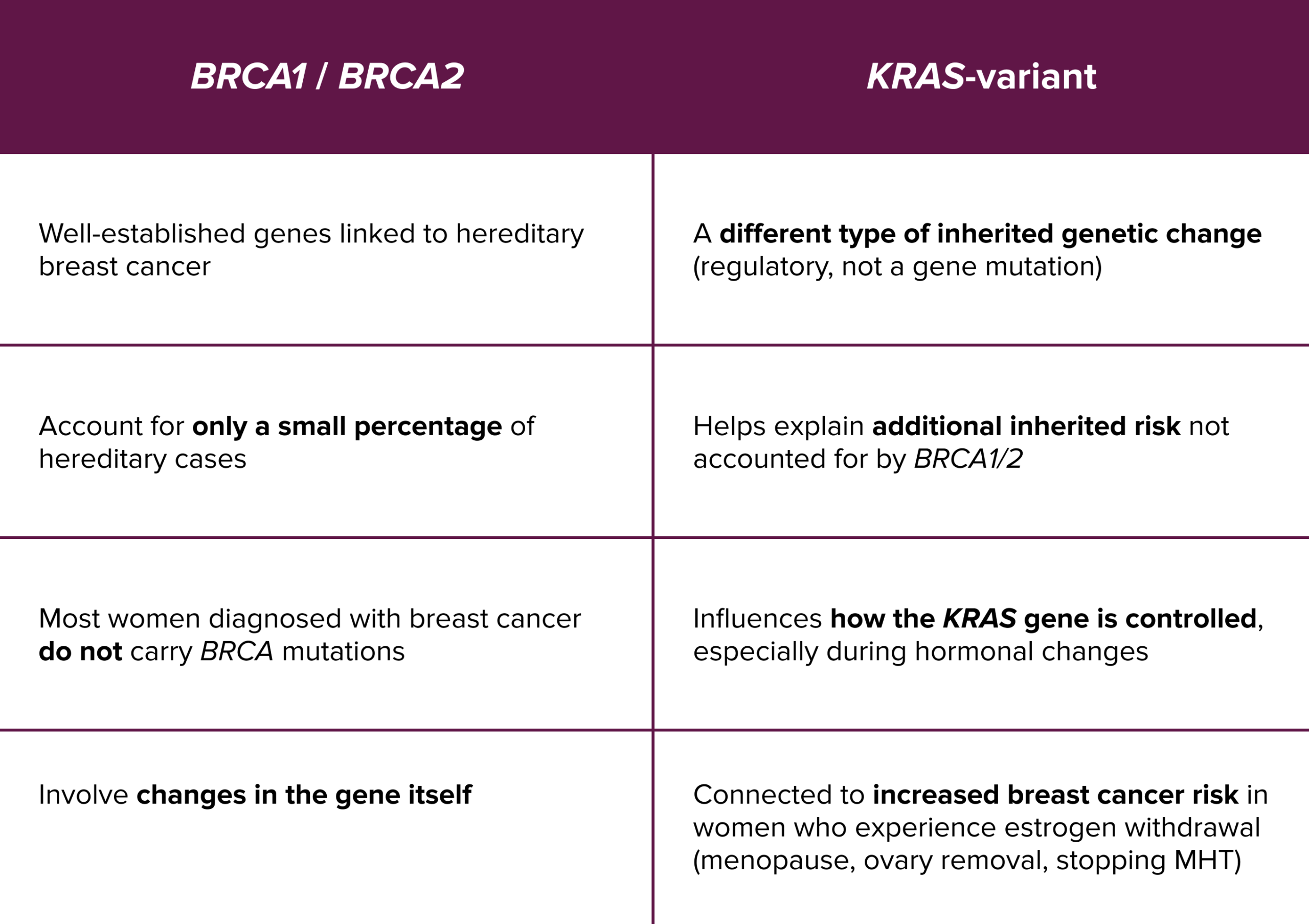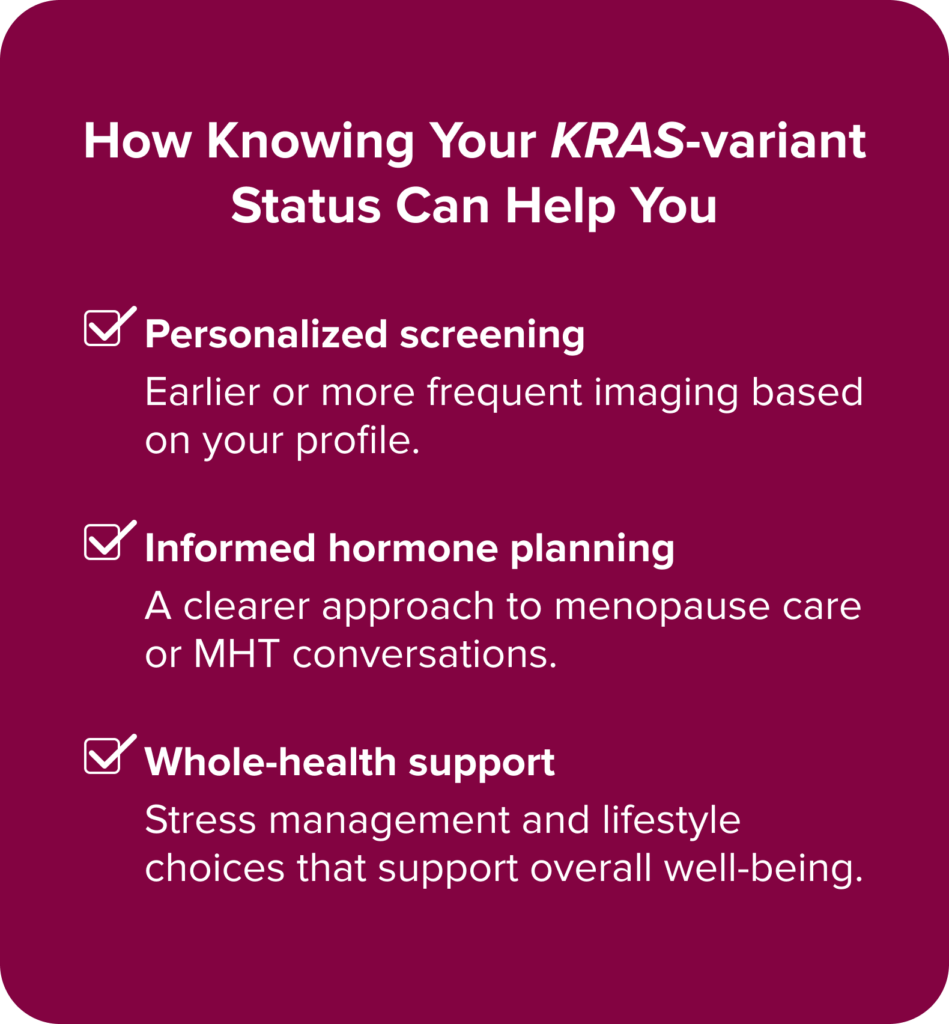Last updated: 11/25/2025
Most people are familiar with BRCA1 and BRCA2, the genes best known for their link to hereditary breast cancer. Discoveries of these mutations have offered important clues about inherited cancer risk, helping many families understand their genetic background. Yet, BRCA1 and BRCA2 explain only a small part of the picture—the vast majority of women diagnosed with breast cancer do not carry either mutation.1
Researchers have also identified another inherited factor that may explain some of the remaining genetic risk: the KRAS-variant. This variant, co-discovered by MiraKind’s founder, Dr. Joanne Weidhaas, provides new clues about how genetic and hormonal changes contribute to breast cancer.2
This article will help you understand what the KRAS-variant is, how it can affect breast cancer risk, and what steps you can take to learn more about your own genetic risk.

How the KRAS-variant Affects Breast Cancer Risk
The KRAS-variant is not the same as KRAS mutations that occur in tumors. Instead, it’s an inherited genetic change—present in every cell of the body from birth—that affects how the KRAS gene is regulated.
Because the KRAS gene helps control normal cell growth and division, and the KRAS-variant is in the control center of the KRAS gene, not surprisingly, people that have the KRAS-variant have been found to respond differently to stress, including estrogen loss or cancer therapy. In fact, research shows that women who carry the KRAS-variant and experience estrogen withdrawal—such as during menopause, after ovary removal, or when discontinuing menopausal hormone therapy (MHT), formerly hormone replacement therapy (HRT)—may have an increased risk of developing breast cancer, including more aggressive forms such as triple-negative breast cancer.3
Knowing whether you have the KRAS-variant can help you and your doctor make more informed choices about hormone use, menopause care, and ways to reduce your breast cancer risk.
Personalized Prevention and Screening
Knowing your KRAS-variant status allows you and your healthcare provider to take a more personalized and proactive approach to prevention and screening.
This can include:
- Enhanced screening: Considering earlier or more frequent breast imaging—such as mammograms or MRIs—to catch potential issues sooner.
- Hormone therapy planning: Discussing the safest way to manage menopause or hormone therapy, since changes in estrogen levels may affect risk.
- Lifestyle considerations: While you can’t change your genes, managing stress and making healthy lifestyle choices can support overall well-being.

Webinar Replay: KRAS-variant and Breast Cancer
This replay features a past webinar and FAQ session on the KRAS-variant with Dr. Joanne Weidhaas. Watch the replay below to hear directly from the scientist who co-discovered this important genetic variant.
In this presentation and Q&A, Dr. Weidhaas discusses:
- How the KRAS-variant influences breast cancer risk
- Why some women are more affected by estrogen withdrawal than others
- What the KRAS-variant means for menopause management, hormone therapy, and personalized prevention
- How understanding your genetic profile can guide screening and treatment decisions
Watch the replay ▶
Learn More
If you’d like to explore this topic further, MiraKind offers additional resources to help you make sense of your results and next steps:
- Understanding Your KRAS-variant Results
Learn how to interpret your test results, understand your personal risk, and discuss them with your doctor. - Learn More About the KRAS-variant
Explore research studies, scientific publications, and stories from individuals learning how the KRAS-variant affects their health journey.
Have More Questions?
At MiraKind, we believe that knowledge is power. Understanding your genetic makeup is the first step toward informed choices and proactive health care.
Do you have more questions about breast cancer and the KRAS-variant?
Enter them below—our team is here to help you navigate your genetic insights with confidence and clarity.
References




Leave a Reply